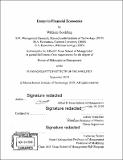Essays in financial economics
Author(s)
Goulding, William,Ph. D.Massachusetts Institute of Technology.
Download1149090932-MIT.pdf (10.28Mb)
Other Contributors
Sloan School of Management.
Advisor
Adrien Verdelhan.
Terms of use
Metadata
Show full item recordAbstract
The essays in this thesis study the impacts of regulation designed to curtail the accumulation of counterparty credit risk exposure at large banks on intermediation in over-the-counter derivatives markets. In Chapter 1 I analyze the effect on equity holders of regulation focused on exposures held off-balance sheet. While requiring banks to hold capital against their on-balance sheet exposures largely doses not perturb equity holder valuation, capital held against off-balance sheet exposures decreases the equity claim by generating a deleveraging effect when the balance sheet is expanded. Shareholders command a premium to compensate for the change in the value of their claim, leading to a deviation of prices of redundant derivative claims from their replicating portfolios. Importantly, this effect does not appear under a standard leverage ratio. Chapter 2 examines the impact of regulation designed to reduce counterparty risk between large banks on trading behavior in over-the-counter derivatives markets. In particular, I use trade-level data in a causally identified setting to show that the counterparty risk portion of the Supplementary Leverage Ratio reduces trading volume in foreign exchange swaps and increases price on executed transactions. Further, I show that over-the-counter derivative netting creates a connection between derivatives of differing underlying asset classes through regulatory constraint. The effects of information disclosure in annual stress testing exercises conducted by the Federal Reserve are analyzed in Chapter 3. I find evidence of a reduction in intermediation activity in foreign exchange derivatives following stress test scenario announcement and an increase following results announcement. While changes in volume show a consistent effect across test implementations, pricing effects are heterogeneous. My results show that the degree to which the stress testing process affects bank portfolio allocation in reference to its primary regulatory ratios is important in explaining the effects of information disclosure, with trading behavior adjusting to restore an optimal set of regulatory constraints conditional on stress test scenarios.
Description
Thesis: Ph. D., Massachusetts Institute of Technology, Sloan School of Management, 2019 Cataloged from PDF version of thesis. Includes bibliographical references.
Date issued
2019Department
Sloan School of ManagementPublisher
Massachusetts Institute of Technology
Keywords
Sloan School of Management.